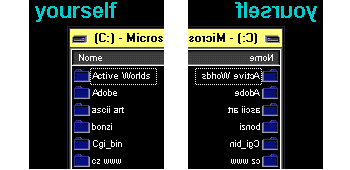

 |
|||||||||||||||||||||||||||||
|
| |||||||||||||||||||||||||||||
|
STATEMENT: "Today the only possible form of portrait is a www project, where the person is not important. The important thing is the personal mental identity: e-mail; avatar; ftp login; nicknames, emoticons and so on. The websites can become a wonderful example of portraits. You are your C: You are your hard disk. This idea is at the base of a 2000 work on the www, www.e-sm.org. www.e-sm.org is a perfect contemporary portrait (pc + ie5+); it is a modern soul mirror. Eyes are no more the soul mirror of a person; on the contrary the computer or the hard disk are. (Nowadays, of a person, it is easily to know his email or his nickname instead of his face…). For all this things: you are your Hard Disk. You are what search engines find. This is the upgrade of: You are your c: TO SUMMARIZE: u 'r your c*: this is the thought, the soul, the entire moral person, on his totality. u 'r what search engines find: this is the cloth. Or better, this is the wardrobe which contains all the clothes and inevitably also the skeletons, scattered during the life. *PEER TO PEER technology is the right way to understand this concept." (Carlo Zanni) Visually, this work of Carlo Zanni's is of unsparing simplicity. The visitor is invited to contemplate himself by clicking on a link that immediately displays the contents of his hard drive on the screen, that is, the equivalent of his "soul" or of intimate being for the twenty-first century. Zanni, with his "modern soul mirror", invites us to a new mirror stage for the computing age. In Lacanian theory, the mirror stage corresponds to that moment where the child recognizes himself as himself for the first time in a mirror, laughs at his image, and says to himself, or is told: "Your are this" (cf. Roland Barthes par Roland Barthes). "It suffices to understand the mirror stage as an identification in the full meaning that analysis gives to this term : i.e. the transformation produced in the subject when he assumes an image of himself […] This jubilant assumption of his specular image by the child at the infans stage, still sunk in his motor incapacity and nursing dependence, would seem to exhibit in an exemplary situation the symbolic matrix in which the I is precipitated in a primordial form, before it is objectified in the dialectic of identification with the other, and before language restores to it, in the universal, its function as subject. (Jacques Lacan, "The Mirror Stage as Formative of the Function of the I", transl. by Alan Sheridan, in Écrits - A Selection, W.W. Norton & Co., New York, 1977).Thus the subject, having already recognized himself as such a first time in the contemplation of his physical being in the mirror, must, in contemplating himself in the mirror that Zanni provides, recognize himself a second time in the image of his virtual being. Here too, his image resembles, yet also escapes him. "This", "C:", is me and not me, neither more nor less than my body, private and yet also living an objective reality that renders it too often a stranger to me. Because my body, like all the files organized on my hard drive, presents a unified, and hence ideal image of myself, of that self which, in the secrecy of itself - in the heart of my soul -, most often feels, on the contrary, multiple and fragmented. In the end, though, it is indeed the function of the portrait to seek to glue together, at least for the time of forming a somewhat impelling image, the scattered pieces of my being.
Anne-Marie Boisvert N.B. Read the interview with Carlo Zanni in this issue. |
||||||||||||||||||||||||||||
Courriel / email : courrier@ciac.ca
Tél.: (514) 288-0811 Fax: (514) 288-5021
